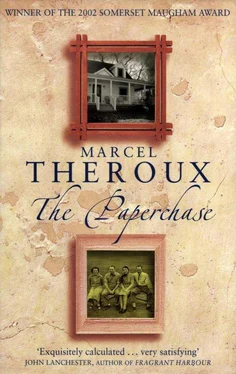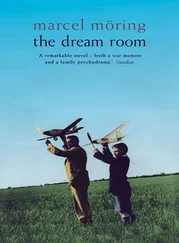The woman nodded again, and then pointed first at herself and then at her daughter, who was unloading more groceries from the back of the station wagon and placing them on the driveway. It was only a small thing, but I was struck by the elegance and fluidity of her pointing, especially as she was a large, not particularly graceful-looking woman.
‘I need to use the phone,’ I said slowly, making a phone shape with the thumb and little finger of my right hand.
The woman smiled warmly and indicated that I should follow her into the house.
It seemed slightly odd to me that the family had a phone at all, but they did. It was coupled to a keyboard and had a screen for receiving typed messages.
Mr Diaz was effusively apologetic. He said that by ‘porch’ he had meant the tiny gingerbread entrance that faced the road — the opposite side to where I’d been searching. He offered to drive over and help me look for the keys, but I told him I was quite sure I’d be able to find them now. In that case, he said, he would drop by the following day to make sure I was safely in.
While we were talking, my neighbours were packing their shopping away into the cupboards around the kitchen. It was disorienting to be suddenly welcomed into the bustle of a family. The long, low-ceilinged room I was in was split into two sections by a breakfast bar. On one side was the kitchen, with its reassuring clutter, and on the other was a dining table and a hutch for crockery. The boy had gone into a room that gave off the main area. I could see the back of his head silhouetted by the flickering light of a television set. He had the volume turned up to just below the point where it would cause distortion.
The mother put a glass of iced tea in my hand, and went to speak to her son. I thought for a moment that she was going to ask him to turn down the sound. Instead, his head emerged from the doorway at a slight angle.
‘Mom says you can stay and eat,’ he said, as I hung up the phone. He had a milk moustache around his mouth.
His mother was frying some Italian sausages and the smell of them was making me salivate. I hadn’t eaten properly since the flight and was tempted to stay, but I couldn’t face an hour or so of polite incomprehension and improvised sign language.
I pointed at my watch and mimed a flying plane and then falling asleep on my own folded hands. Before I left, I wrote down my name and address on a piece of paper as a kind of introduction. The woman did the same. My new neighbours were Harriet Fernshaw and her children Nathan and Theresa.
While Nathan’s hearing was unimpaired, Terry was as deaf as her mother. I could see mother and daughter framed in the kitchen window when I looked back from the driveway. It was eerie to watch them communicating wordlessly, flicking their hands in movements that resembled the gestures which accompany speech, but were speech in its entirety to them. A spoken language I might learn, but theirs seemed like a mystery that would exclude me for ever.
The keys were exactly where Mr Diaz had said they would be. I fitted them into the door with enormous, exhausted relief. I had anticipated getting into the house quite differently: ceremoniously taking possession of it, room by room. Instead, I was almost too tired to drag my luggage into the kitchen. The house was stuffy and dusty from weeks of standing unoccupied. My appetite had all but vanished, so I just drank a glass of water from a tap in the kitchen and stumbled upstairs to one of the guest bedrooms. I remember consciously deciding not to go to bed in my uncle’s old room because it didn’t seem right, but after that sleep overtook me so fast, it was like being knocked down by a wave.
I WOKE UP SUDDENLY in a pitch-black bedroom with no idea of the time and a tinny ringing noise going off in my ears. My first thought was that I had overslept and would have to get dressed quickly to make it to work for my night shift. But the sound was not coming from my own room, and there was a smell in the air that reminded me I was in unfamiliar territory. I dragged myself out of bed and stumbled across the landing. The phosphorescence on the illuminated dial of my uncle’s clock radio betrayed the source of the noise. The cheap fake plastic set had been playing an hour’s worth of Golden Oldies to the empty house at 5 a.m. each morning since the day my uncle died. I snapped it off and sank on to Patrick’s narrow single bed.
My uncle’s room was the largest of all the bedrooms. The summer Vivian and I painted the exterior, Patrick had done up his own room. He painted it a deep shade of blue he had concocted himself. He goaded the incredulous sales clerk at the hardware store in Westwich into adding squirt after squirt of red paint. The boy’s hands had paused on the levers. ‘More?’ My uncle grabbed the lever himself and pumped red paint into the mixture in order to obtain the shade he wanted.
I felt slightly intrusive here among Patrick’s most personal possessions. The Afghan rug with the Harvard motto that my grandmother had crocheted for him when he won his place at law school; the shelves of books; his woodcut of the crucifixion; the religious figurines; the icon above his bed that he’d smuggled out of Leningrad in a tea towel. It was probably worthless, but the story of its provenance made it seem priceless to me.
There was a stack of books reaching up almost to the top of the bedside table. I picked up the first volume — a trashy biography of Frank Sinatra. Beneath it was a book on Moroccan cookery.
I got out of bed and wandered through the rooms on the upper floor. The study seemed chilly. A window in front of the desk was half open. It didn’t really strike me as odd at the time. I just assumed someone had left it open to air the study.
I sat down at the desk. The sea from the window was a leaden smear. The skull and the row of green files had gone, leaving a faint outline in the dust on the desk. I searched carefully through the drawers and found nothing, except a batch of fruity love letters in sprawling feminine handwriting. It seemed slightly indecent to read them, but I couldn’t help glancing at a couple.
I was disappointed not to find any more of Patrick’s writing, but consoled myself that something would turn up.
I lay on my bed not sleeping for the next hour. The windows on two sides of the room began to glow with clear seaside light. I began to think it was a lovely room to wake up in. Its wooden floor and walls were painted a pale lime green. There was a green ashtray in a cast-iron stand a few yards from the bed; a greenish commode by the window that Patrick had stripped of paint; a marble-topped stand which held a pitcher and bowl with a floral design; strange allegorical woodcuts on the walls. In another old-fashioned touch, the lumpy bed had bolsters instead of pillows.
But the prettiness of the room — like the house itself — was of a very fragile kind. It had been arranged for people to pass through fairly quickly, not for them to stay and make a life there. Anyone who stayed longer than a few minutes would begin to notice small mistakes and inconveniences. The orange anglepoise lamp on the dressing table was jarringly out of place; the bed sagged; the door on the commode was broken; in the bottom of the pitcher was a large dead spider, its legs shrivelled up round its body — it looked like a tiny grappling iron, left behind by a tiny prisoner.
And still, it was the inconsistencies and lapses of good taste that reminded me most of Patrick. Where he had tried to create an atmosphere of soothing Victorian calm, he had only managed to emphasise his eccentricities. In this room, some of the details were mysterious — why the lamp, which must have been brought from another room and forgotten? But together, the many indications of disuse spoke of a solitary life. I began to feel sorry for him. This was a guest bedroom, after all, that had never held any guests. It was like the roped-off bedrooms at Hampton Court; any sense of life beyond the furniture was wholly illusory.
Читать дальше












